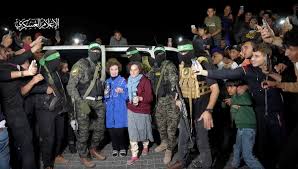Hostage Release in the Middle East: A Glimmer of Hope Amidst Conflict

The Middle East has long been a region of political turbulence, with various nations and groups entangled in conflicts that often affect innocent lives. One of the most heart-wrenching aspects of these wars is the capture and prolonged imprisonment of hostages. However, amidst the ongoing violence, there are occasional moments of hope that bring light to otherwise dark situations.
Recently, a significant event unfolded as three hostages—Israeli citizens—held by Hamas for more than 490 days have been released. This marks a pivotal moment in the Israeli-Palestinian conflict, shedding light on the complexities of such hostage situations while providing a glimmer of optimism in the face of decades of violence.
The Hostages: A Long and Harrowing Ordeal
The hostages—Iair Horn, Sagui Dekel Chen, and Sasha Troufanov—were captured by Hamas, the Palestinian militant organization, in what seemed like an unending saga of violence and retaliation. Their families, friends, and the international community anxiously awaited their release for nearly 500 days, uncertain of the fate that awaited them. The ordeal these hostages endured is a grim reminder of the human cost of political and military struggles, where individuals often find themselves at the mercy of larger geopolitical forces.
Over the months, the families of the hostages rallied for their release, calling on both sides of the conflict to prioritize human lives over political agendas. The emotional toll on families is unimaginable, as they struggle with uncertainty and fear while their loved ones remain in the hands of armed groups with unclear intentions.
A Fragile Ceasefire and a New Beginning?
The hostages’ release was part of a ceasefire agreement brokered between Israel and Hamas, signaling a tentative step toward peace. While such agreements are often fragile and short-lived, their significance cannot be overstated. The ceasefire has provided a brief but essential moment of peace, allowing for the release of these three hostages and, hopefully, offering an opportunity to begin addressing broader humanitarian concerns in the region.
It’s important to understand that the release of hostages is not just a victory for the individuals involved—it’s a sign of hope for others who remain captive. The lives of countless people are often at the mercy of political negotiations, with hostages sometimes being used as bargaining chips in larger geopolitical games. The release of these hostages could inspire further calls for peace and might even open doors for more hostages to be freed, bringing much-needed relief to families caught in the middle of conflict.
The Complexity of Hostage Situations
Hostage situations in conflict zones, particularly in the Middle East, are never straightforward. The motivations behind such kidnappings and imprisonments are rooted in deep political, ideological, and religious differences. For Hamas, capturing hostages has often been a way to leverage political concessions from Israel or to assert power and influence in the region. For Israel, the release of hostages is often tied to security concerns and broader peace negotiations.
As much as these moments of release are welcomed, they are also reminders of the larger conflict that continues to impact the region. Hostage-taking is not just about the lives of those directly affected; it’s about the geopolitical tensions and the complex histories that fuel such violent actions. The political landscape in the Middle East remains unstable, and while the release of hostages is a positive step, it does not erase the underlying issues that lead to such devastating situations.
Moving Toward Peace: Will This Be the Turning Point?
While the release of hostages is a significant and heartening event, it remains to be seen if this will lead to a larger breakthrough in the Israeli-Palestinian conflict. Ceasefire agreements, though crucial, are often temporary solutions that fail to address the root causes of violence and suffering. The world continues to watch closely, hoping that this small but meaningful victory will inspire further dialogue and peace efforts.
The international community has a critical role to play in fostering peace in the Middle East. It must provide support for the ongoing humanitarian efforts and encourage dialogue between the warring parties. While individual victories like hostage releases are important, they must be part of a broader effort to bring about lasting peace, security, and human rights for all in the region.
Comments:
No comments yet. Be the first to comment!